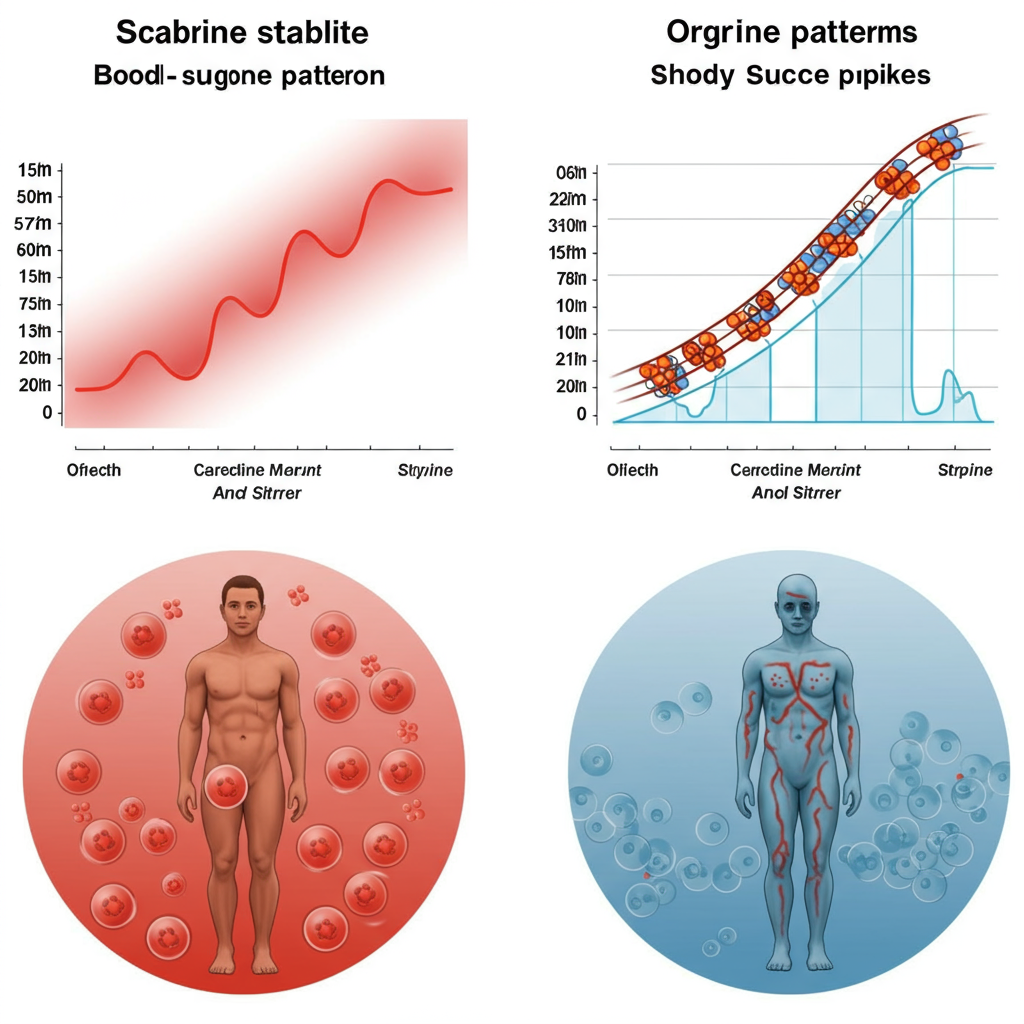Blood Sugar Rollercoaster: How Glucose Spikes and Inflammation Accelerate Aging
In my practice, I've seen countless patients whose bodies are aging far faster than their years would suggest. The culprit? A dangerous duo that lurks in the modern American diet and lifestyle: blood sugar spikes and chronic inflammation. These twin forces don't just contribute to diabetes—they're fundamentally aging your body at the cellular level. Let's dive into how this happens and what you can do to break this damaging cycle.
The Blood Sugar-Inflammation Connection
When you eat that bagel, drink that fruit juice, or indulge in processed carbohydrates, your blood sugar doesn't just rise—it rockets upward. This isn't how our bodies were designed to function. Our ancestors never experienced the glucose tsunamis that modern foods create.
These blood sugar spikes trigger an immediate inflammatory response. Your body releases inflammatory cytokines—chemical messengers that sound the alarm throughout your system. This isn't just a theoretical concern—it's happening in real-time inside your body after every high-glycemic meal.
What many people don't realize is that this inflammation doesn't just disappear when blood sugar returns to normal. The damage accumulates, and with each spike, you're essentially adding another small log to a smoldering inflammatory fire in your tissues.

The Cellular Aging Process
At the cellular level, this blood sugar-inflammation cycle accelerates aging through several key mechanisms:
- Advanced Glycation End Products (AGEs): When excess glucose floats around in your bloodstream, it sticks to proteins in a process called glycation. These damaged proteins, known as AGEs, literally cause your tissues to become stiff and dysfunctional. This is why diabetics often develop stiff joints, hardened arteries, and damaged kidneys.

-
Mitochondrial Damage: Your mitochondria—the power plants of your cells—take a direct hit from both high blood sugar and inflammation. When mitochondria can't function properly, your cells lose energy production capacity. This is why chronic blood sugar issues often lead to fatigue and accelerated aging.
-
Telomere Shortening: Perhaps most concerning, research shows that blood sugar spikes and inflammation actually shorten your telomeres—the protective caps on your chromosomes that determine how quickly your cells age. Shorter telomeres mean faster aging and increased disease risk.
This isn't just about diabetes risk—it's about your biological age versus your chronological age. I've seen patients who are 40 going on 70 because of these processes, and conversely, 70-year-olds with the biology of someone decades younger because they've mastered blood sugar control.
Breaking the Cycle: Functional Medicine Solutions
The good news? This aging cycle can be interrupted and even reversed with the right approach:
Ditch the Blood Sugar Rollercoaster: Eliminate foods that spike blood sugar—particularly refined carbohydrates, sugars, and grains. Focus instead on fiber-rich vegetables, healthy fats, and quality proteins that provide steady, sustainable energy.
Timing Matters: Consider time-restricted eating (a form of intermittent fasting) to give your body regular breaks from processing glucose. Many of my patients find that limiting eating to an 8-10 hour window dramatically improves their metabolic health.
Anti-Inflammatory Nutrition: Incorporate natural anti-inflammatory foods like wild-caught fatty fish (for omega-3s), turmeric, ginger, and deeply colored berries. These foods provide compounds that actively combat the inflammatory cascade triggered by blood sugar spikes.

Movement as Medicine: Regular physical activity is non-negotiable. Even a 15-minute walk after meals can reduce post-meal blood sugar spikes by up to 30%. Resistance training is particularly effective for improving long-term insulin sensitivity.
Stress Management: Chronic stress drives both inflammation and blood sugar dysregulation. Daily mindfulness practices, adequate sleep, and stress reduction techniques aren't luxury items—they're essential medicine for your metabolic health.
Strategic Supplements: Compounds like berberine, alpha-lipoic acid, chromium, and magnesium can help regulate blood sugar and reduce inflammation, creating a powerful combined effect on your metabolic health.
The path to reversing this aging duo isn't found in treating the symptoms or managing the disease. It's found in addressing the root causes—removing the triggers that create blood sugar spikes and inflammation in the first place.
Remember, your body has an extraordinary capacity to heal when given the right conditions. By stabilizing your blood sugar, you're not just preventing diabetes—you're fundamentally changing the rate at which your body ages.
The choice is yours: continue on the blood sugar rollercoaster and accept accelerated aging, or step off the ride and reclaim the vitality that is your birthright.
References:
-
Prattichizzo F, De Nigris V, Spiga R, et al. Inflammageing and metaflammation: The yin and yang of type 2 diabetes. Ageing Research Reviews. 2018;41:1-17.
-
Monnier VM, Sell DR, Genuth S. Glycation products as markers and predictors of the progression of diabetic complications. Annals of the New York Academy of Sciences. 2005;1043:567-581.






